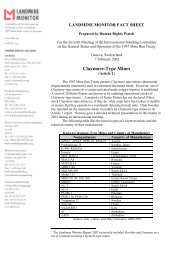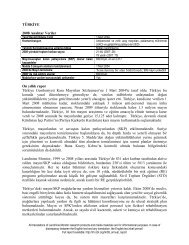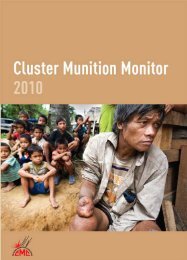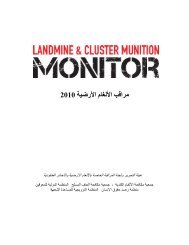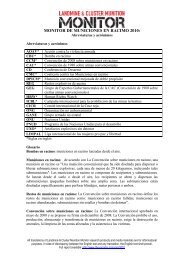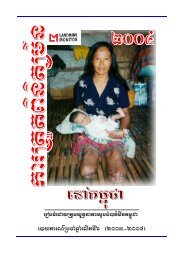Download PDF - Landmine and Cluster Munition Monitor
Download PDF - Landmine and Cluster Munition Monitor
Download PDF - Landmine and Cluster Munition Monitor
Create successful ePaper yourself
Turn your PDF publications into a flip-book with our unique Google optimized e-Paper software.
Casualties <strong>and</strong> Victim Assistance<br />
• In Lebanon, quality physical rehabilitation was provided despite a decrease in funding that resulted in fewer<br />
actual services. 53<br />
• In Montenegro, the government’s recognition of cluster munition victims has allowed them to register for<br />
national insurance, increasing their ability to receive medical care <strong>and</strong> physical rehabilitation. 54<br />
• In Mozambique, availability of information on services for survivors increased with the development of new<br />
support services through the cooperation of an international NGO <strong>and</strong> the national survivor organization. 55<br />
• Although no specific progress was reported in Sierra Leone, it has ongoing services for persons with disabilities,<br />
including survivors <strong>and</strong> victims of war. 56<br />
The <strong>Monitor</strong> unfortunately identified a range of implementation inadequacies <strong>and</strong> resource challenges in the provision<br />
of victim assistance by States Parties in 2011 <strong>and</strong> the first half of 2012.<br />
Decreased funding reduced the availability of victim assistance services in Albania, BiH <strong>and</strong> Lebanon, where service<br />
providers struggled to make the most of limited resources <strong>and</strong> to identify new sources of funding. The cost of some<br />
medical services increased in Lebanon, affecting the affordability for mine/ERW victims. During the same period, the<br />
government raised awareness about the right for persons with disabilities to receive free medical attention, though some<br />
survivors reported being rejected despite being eligible. Increased awareness about the availability of free medical<br />
<strong>and</strong> rehabilitation services in Mozambique, without any corresponding increase in number of medical professionals or<br />
medical <strong>and</strong> rehabilitative supplies available, lengthened waiting lists for care. In Lebanon <strong>and</strong> Montenegro, ineffective<br />
implementation or regulation of national insurance systems led to survivors <strong>and</strong> other persons with disabilities being<br />
refused medical care to which they were entitled.<br />
Physical rehabilitation was generally more available <strong>and</strong> received greater focus <strong>and</strong> resources as compared to the<br />
other core victim assistance services, such as economic inclusion <strong>and</strong> psychological support. In Albania, prosthetics<br />
centers faced a lack of funding, although the rehabilitation sector was strengthened through training. In BiH <strong>and</strong> Croatia,<br />
no change or improvement was reported <strong>and</strong> the quality of prosthetic devices was variable. The number of survivors<br />
receiving physical rehabilitation services in Lebanon decreased due to reduced international funding; some organizations<br />
postponed physical rehabilitation projects planned for 2011 until 2012 due to their involvement in Lebanon’s hosting of<br />
the convention’s Second Meeting of States Parties, in September 2011.<br />
Psychosocial support remained one of the most neglected areas of victim assistance; States Parties supporting such<br />
services reported little or no progress. In Afghanistan <strong>and</strong> BiH, funding decreased for peer-to-peer support provided by<br />
NGOs.<br />
Economic inclusion services were lacking; the services that did exist were generally provided by NGOs. State quotas<br />
for the employment of persons with disabilities were often reported but never fulfilled, as in Croatia <strong>and</strong> Lebanon.<br />
Regulations requiring physical accessibility for persons with disabilities were not adequately enforced in any State<br />
Party.<br />
Many ongoing victim assistance challenges were faced in Guinea-Bissau, which for years had no victim assistance<br />
program due to poverty <strong>and</strong> lack of infrastructure, <strong>and</strong> in Sierra Leone, which has many victims of conflict (including<br />
amputees) but which has limited rehabilitation services. 57<br />
Signatories to the convention continued to face numerous victim assistance challenges. In Angola <strong>and</strong> Ug<strong>and</strong>a,<br />
availability of physical rehabilitation <strong>and</strong> other victim assistance services continued to decrease as international<br />
organizations closed their programs. No significant changes were identified in Chad, where a lack of resources <strong>and</strong><br />
infrastructure has interfered with the provision of adequate services. 58 In DRC, new targeted funding for victim assistance<br />
has increased the availability of, <strong>and</strong> access to, medical <strong>and</strong> physical rehabilitation services, though the programs remain<br />
limited. 59 Iraq is decreasing its dependence on the ICRC for emergency medical care supplies, <strong>and</strong> access to physical<br />
rehabilitation increased as a new rehabilitation center opened; three more are under construction. 60 In Colombia, the<br />
availability of rehabilitation services decreased in 2011 following a decline in international funding for victim assistance. 61<br />
Countries with cluster munition victims that have not joined the convention (Cambodia, Eritrea, Ethiopia, Georgia,<br />
Serbia, Sudan, Tajikistan, <strong>and</strong> Vietnam) generally achieved less progress <strong>and</strong> faced greater challenges in providing victim<br />
assistance. In Libya, the 2011 conflict disrupted the delivery of victim assistance, but by the end of the year national<br />
53<br />
Response to <strong>Monitor</strong> questionnaire from Habbouba Aoun, Coordinator, <strong>L<strong>and</strong>mine</strong>s Resource Center in Lebanon (LMRC), 8 March 2012; <strong>and</strong><br />
Response to <strong>Monitor</strong> questionnaire from Khaled Yamout, NPA, 17 June 2012.<br />
54<br />
Statement of Montenegro, Convention on <strong>Cluster</strong> <strong>Munition</strong>s Working Group on Victim Assistance, Geneva, 16 April 2012.<br />
55<br />
Response to <strong>Monitor</strong> questionnaire by Luis Silvestre Wamusse, RAVIM, 7 June 2012; interview with Macario Dubalelane, Head of<br />
Department for Persons with Disabilities, MMAS, in Geneva, 21 May 2012.<br />
56<br />
HI, “Where we work – Africa: Sierra Leone, A nation of amputees” (undated but 2012). http://bit.ly/MXGGwi.<br />
57<br />
HI, “Where we work – Africa: Sierra Leone, A nation of amputees” (undated but 2012). http://bit.ly/MXGGwi; Statement of Guinea-Bissau,<br />
Mine Ban Treaty, Eleventh Meeting of States Parties, Phnom Penh, 29 November 2011.<br />
58<br />
ICRC, Physical Rehabilitation Programme, “Annual Report 2010,” May 2011, Geneva, p. 25.<br />
59<br />
Response to <strong>Monitor</strong> questionnaire by Louis Ibonge Numbi, Victim Assistance Focal Point, Ministry of Social Affairs, Kinshasa, 25 May<br />
2012.<br />
60<br />
ICRC, “Annual Report 2011,” Geneva, May 2012, pp. 379-383.<br />
61<br />
Response to <strong>Monitor</strong> questionnaire by Johana Huertas, National Mine Action Coordinator, H<strong>and</strong>icap International, 30 March 2012.<br />
59



